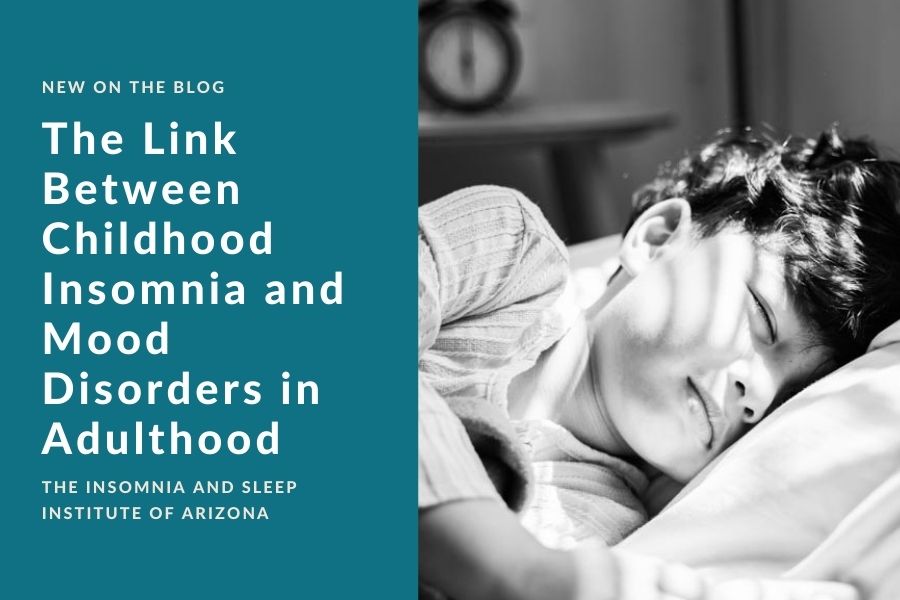The Insomnia and Sleep Institute of Arizona treats both adults and pediatric patients as young as two years old. Not only is it possible for a person of any age to struggle with sleep disorders, but recent research shows that children with insomnia have a higher likelihood of being diagnosed with mood disorders and anxiety as adults. The sooner you start treating any sleep disorder, the sooner you (or your child) can enjoy relief and potentially stave off co-morbidities and complications. We are proud to have been voted “Top Doc” in the region for six consecutive years and look forward to caring for you at what has been dubbed the Face of Sleep Medicine in Phoenix.
The research that addresses links between childhood insomnia and adult mood disorders was presented at the annual Associated Professional Sleep Societies meeting, Virtual SLEEP 2021. According to researchers, insomnia that is allowed to persist into adulthood has been shown to increase the odds of internalizing disorders for young adults. However, the lead investigator stresses that “as insomnia symptoms may precipitate or maintain internalizing disorders, our findings further reinforce the need for early sleep interventions to prevent future mental health disorders.”
Insomnia Study Details
The authors of the study used data from a sampling of 700 children in the Penn State Child Cohort. This longitudinal study included children with a median age of nine. Of these children, 421 were met eight years later (median age 16) while 502 were met 15 years later (median age 24). Researchers claim their findings make it “very clear that the risk of having internalizing disorders in young adulthood associated with having persistent insomnia symptoms.” In fact, there appears to be a threefold increase in risk of an adult internalizing disorder occurring in patients who had “persistent” insomnia symptoms as a child. Those who reported “incident” insomnia saw a twofold increase in risk. However, those who only had occasional (“waxing and waning”) insomnia symptoms were only slightly more likely to experience an internalizing disorder as an adult.
Treating insomnia in both adults and children requires working with a sleep clinic staffed by sleep specialists who concentrate in sleep medicine. The Insomnia and Sleep Institute has unprecedented staffing levels where patients have access to three sleep specialists, a physician assistant with a Masters in Sleep, nurse practitioners trained in sleep medicine—and a clinical psychologist focused on cognitive behavioral therapy (CBT) for insomnia. CBT is considered the gold standard when it comes to insomnia treatments.
Insomnia Treatment for All Ages
The good news is that while researchers have found a strong tie between persistent insomnia and unwanted mental health outcomes, those in remission from insomnia have a “good prognosis.” Still, this particular study shows that 40 percent of children don’t simply outgrow insomnia as they become adolescents, which puts them at a higher risk of mental health disorders as they continue to mature. This percentage is in keeping with other studies and highlights how critical it is to treat insomnia as soon as it is noticed by parents.
A spokesperson for the American Academy of Sleep Medicine says, “There is a connection with mood and anxiety disorders with sleep, especially insomnia. This is a good reminder that reviewing someone’s sleep habits should always be a part of assessing someone’s mental health.” For pediatric patients, this falls on the responsibility of the parents or guardians who deserve an outcome-driven clinic that prioritizes having a correct diagnosis first. This diagnosis can then inform testing and treatment decisions. Consultations at The Insomnia and Sleep Institute are always with sleep specialists.
Does Your Child (or You) Have Insomnia?
Insomnia symptoms can present in a number of ways and can include trouble both falling asleep and staying asleep. If you suspect you or your child has insomnia, the first step is a consultation with a sleep specialist. Insomnia treatment does not usually require long-term medication, and sometimes no medication is necessary at all as is the case with CBT-I, which is an effective tool that foregoes the need for any pharmaceutical intervention. Get the sleep you need and deserve for optimal health starting today.
We are setting the standard for sleep medicine in Arizona and look forward to helping you address all of your sleep concerns. Contact The Insomnia and Sleep Institute today by completing the online form or calling the office.





